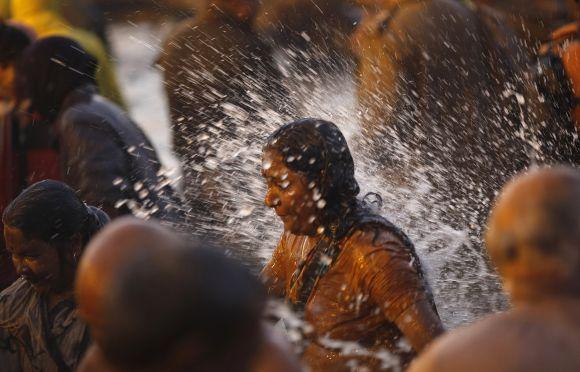
Over three crore Hindu devotees took their cherished holy dip at the 'Sangam' in Allahabad on Sunday on 'Mauni Amavasya', widely believed to be the most auspicious of all days at the 55-day long Kumbh Mela.
The mammoth crowds spanning across every inch of the 58-sq km spread along the sand banks of the highly revered confluence of Ganga, Yamuna and the mythical Saraswati rivers clearly sent across one message -- never before have as many people assembled at a place on the planet earth.
To say that it was an ocean of humanity would be an understatement of the crowds seen all over the sprawling length and breadth of the Kumbh Mela area. The 160-km long temporary roads laid on the sandy banks to facilitate easy commuting in the area, remained completely swarmed with human heads trudging up and down the 'Sangam'.
"We do not mind even if we are allowed to remain in the water for just 10 or 15 seconds; even that fulfils our life's most cherished desire; we feel blessed to insure a smooth ride to heaven", quipped Santosh Kumar, a primary school teacher who came all the way from Hyderabad.
Please ...
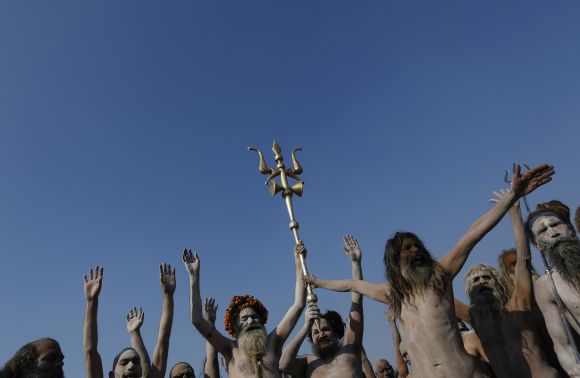
It was the unprecedented congregation that makes this festival of faith distinct from all other festivals. The urge for a dip is visible on the face of all and sundry, converging here from every nook and corner of the country. Be it the remotest corner of Bengal in East, the farthest point of Maharashtra in the West, Punjab or Rajasthan in the North or Tamil Nadu, Karnataka, Andhra Pradesh and Kerala down South, the auspicious bathing day has drawn people from everywhere.
Water at the 'Sangam' is believed to be blessed with the holy nectar ('amrit') which falls generously from a particular constellation of stars, coinciding with 'Mauni Amavasya'.
While common devotees made a beeline from Saturday afternoon that marked the commencement of 'Mauni Amavasya' (according to the Hindu religious calendar), it was the 'shahi snan' (royal bath) at the break of dawn on Sunday that made the event very, very special.
Please ...
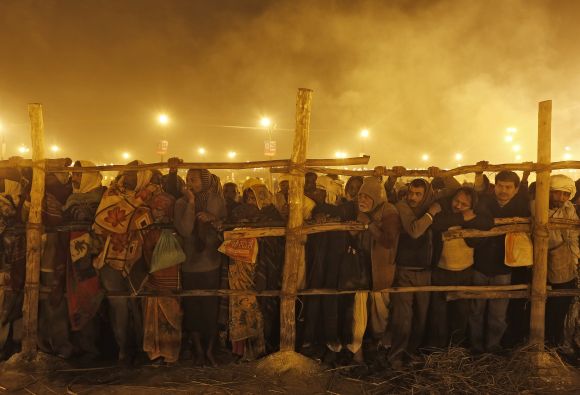
According to chief mela officer Mani Prasad Misra, "About one crore persons had already taken the 'Mauni Amavasya' dip until the midnight of Saturday; and since the exercise continued through the night, the crowds swelled, making the total arrival at the end of the day go well beyond our earlier estimation."
He feels, "It would be no surprise if the number of people taking a dip over the 24-hour stretch of 'Mauni Amavasya' crosses three crores."
The first batch of Naga 'sadhus' -- who are the key attraction at every Kumbh -- stormed into the special enclosure for the 'shahi snan' soon after the sun rose in the East. They were followed by members of the Nirvani Akhara which gets the privilege to be the first of the 13 'akharas' to take a dip and mark the commencement of the 'shahi snan'.
Please ...
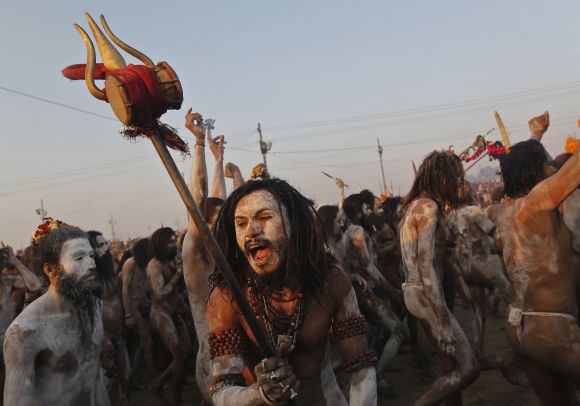
However it was the 'Juna Akhara' that took the cake where numbers were concerned. Even as it was given the third slot, its 5000 'naga' sadhus kept onlookers spellbound for nearly an hour, as they jumped and danced with joy and smeared their naked bodies with the Ganga sand.
Some of the Juna Akhara nagas got so excited that they went jumping on to the water police boats parked just ahead of the bathing area bound by ropes and wooden poles.
Everyone, including the water police, manning the boats, were taken by surprise. And before the cops could realise what had hit them, three of their boats overturned, leaving the policemen in total panic and compelling them to run for their own lives.
"The water was deep enough to drown me, but I managed to wade through and reach the bank", said a young cop drenched from head to toe. Like many others, he belonged to a contingent from Uttarakhand, from where they were specially inducted because of their extremely adept handling of the crowds at the last Maha Kumbh in Haridwar in 2009.
Please ...
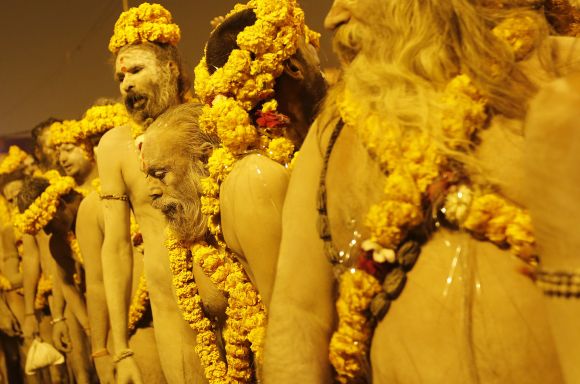
Unlike the past, when Naga sadhus used to turn aggressive on seeing the media, there was a drastic change in their attitude this time around. TV camera became a major attraction for some of them who started doing acts no sooner than they saw cameramen focusing on them.
What became the biggest challenge for the mela administration was the crowd management. And clearly it was no mean task to handle the surge of people on the huge bank earmarked for the 'shahi snan'.
With heavy desilting caused on account of sudden shifting of the course of the Ganga, the administration had reduced the bathing area, causing heavy crowding. Half the length of the 'shahi snan' ghat was shrunk to a narrow four feet corridor, allowing not more than a single file of bathers at one go. Sure enough the time taken for the dip by each of the 'akharas' was prolonged.
"The auspicious period will continue until 5.20 p.m. when the last akhara will depart from sangam" said chief mela officer Misra, who considers the day's accomplishment as "the biggest task of my career."
...